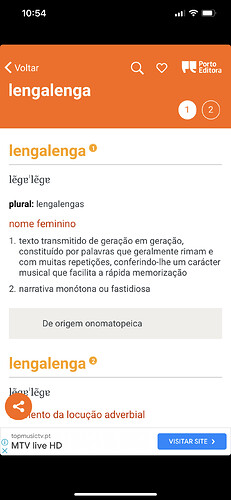I’m about 2/3rds through the A1 units and am having a jolly great time trying to remember the vocabulary and the grammar I’ve learnt so far. I’m aware that the Achilles heel that most folks on the forum highlight is the difficulty of understanding spoken Portuguese.
So I signed up to iTalki, booked trial lessons with 3 different tutors, picked two of them, and have had a few additional lessons. The trial lesson with each was great - I got to practise explaining who I am, where I live, my family, etc. The kind of thing that was fairly easy to prepare for.
In week 2, I dialled in without any preparation. Both tutors tried to make me comfortable speaking, but when the subject was anything other than “o meu nome é, eu moro em Inglaterra, etc”-stuff I simply didn’t have enough vocabulary to string meaningful sentences together.
For my two lessons in week 3, I told each of them in advance what I’d been studying recently here on PP (colours, dates for tutor 1, and numbers, the clock for tutor 2). Both tutors gave me a few questions around that which I would answer, but I didn’t feel like I learnt much from that (the drills in the PP units had already forced me to think through dozens of different ways to use those specific words). One of the tutors was even kind enough to send me a couple of links to alternative study-sources that explained 80-90% of what the PP unit had taught me.
I have now paused the lessons, as I’m not sure how to make best use of the tutors. My grammar is not good enough to have a normal conversation about anything. The shorites had made me optimistic, thinking that with a very limited vocabulary and grammar, it would still be possible to communicate… but they now feel a bit “contrived”, and my experience doesn’t match my expectation.
I need to be able to express “real” sentences… things like “last weekend we had [past tense] friends around, I cooked [excellent chance to practice food-words explaining a recipe] and if the weather is nice [conditional? conjunctive? vague memories from French 40 years ago tells me that this is a difficult area] we will meet up again next week”. But past tense is in an A2 unit at least 2 months into the future with my current speed, and I really believe in spending enough time to fully learn each lesson and memorise the majority of the vocabulary.
So that finally brings me to the question:
How have others made good use of tutors early in the learning? My current thinking is to just pause them for a couple of months, and then magically everything will be fine and we’ll be able to have short conversations. But I don’t know if that is really the right approach, or if there’s anything else I can try now to get benefits with my very limited Portuguese knowledge?
Thanks in advance for any input.

